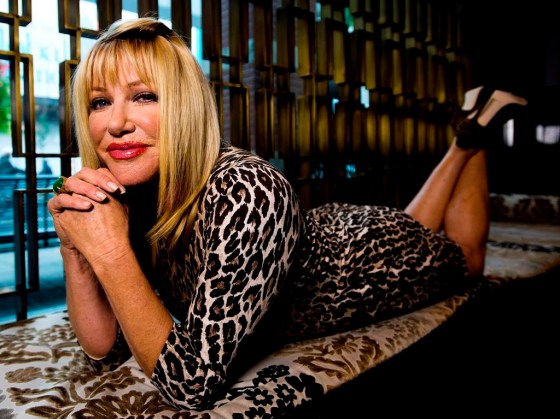|
Halloween week feels like an appropriate time to talk about this IRL horror movie.
Suzanne Somers’ husband Alan Hamel is making an “AI twin” of his late wife. The actor and author died in 2023 at 76 from an aggressive form of breast cancer.
“Obviously, Suzanne was greatly loved, not only by her family, but by millions of people. One of the projects that we have coming up is a really interesting project, the Suzanne AI Twin,” he told People Magazine last week.
Advertisement
 Why this ad? Why this ad?
The Suzanne AI Twin has reportedly been trained on her 27 books as well as past interviews she’s done.
Here are two quotes from the People article that I found particularly bone-chilling:
“I mean, I’ve been with Suzanne for 55 years, so I know what her face looks like, and when I just look at the two of them side by side, I really can’t tell which one is the real and which one is the AI.”
And:
“Once I’m satisfied that we have everything, then we’ll put her on SuzanneSomers.com and we’ll invite all her fans and all our customers to come and talk to her. They can come and just hang out with her. They can ask her any questions they want. She’ll be available 24/7, and I think it’ll be really wonderful.”
Yeah, well, I watched an Entertainment Tonight clip of the Suzanne AI twin and I can assure you it’s the opposite of wonderful. It’s ghoulish and icky and deeply sad. Adding to the ick: the AI twin is of young, Chrissy Snow-era Suzanne, not of Suzanne as she left the world.

Actor Suzanne Somers, known for playing Chrissy Snow on the television show Three’s Company, as well as her business endeavors, died Oct. 15, 2023. She was 76. (Nathan Denette / The Canadian Press files)
Look: grief is complicated, no question. It’s the most difficult part of being alive. It’s hard to let your person go.
But there’s a big difference between keeping someone’s memory alive and… whatever this is.
The public sometimes has trouble letting go of certain beloved celebrities, who are weirdly viewed as public domain. Marilyn Monroe, for example, has never been allowed to rest in peace. She’s been dead for 63 years and people are still reproducing her likeness and debating about her body on the internet.
Now, people aren’t just sharing photos and videos; they are attempting to create something “new” by fully reanimating the dead.
Zelda Williams, daughter of the late Robin Williams, recently took to Instagram to implore people to stop making AI slop of her dad.
“To watch the legacies of real people be condensed down to this ‘vaguely looks and sounds like them so that’s enough,’ just so other people can churn out horrible TikTok slop puppeteering them is maddening,” she wrote in part.
“You’re not making art. You’re making disgusting, over-processed hotdogs out of the lives of human beings — out of the history of art and music — and then shoving them down someone else’s throat, hoping they’ll give you a little thumbs up and like it. Gross.”
The “slop puppeteering” of Somers and Williams strikes me as particularly odd since anyone can just… watch their shows and films? They’ve already been immortalized in ways we mere mortals are not, in ways they consented to, in ways that are art.
But it’s not just celebrities getting the AI treatment. There are AI apps that will animate the photos of dead loved ones for you.
I do not doubt for one second that some people might find this comforting. But it can never, ever give people what they really want. It can’t bring their person back.
To quote my colleague Melissa Martin, writing in her own column about Williams’ plea and AI: “One of the most crucial parts of grief, and of healing, is to find peace with the fact there is a bracket around life that is inviolable. That there will be no new memories, no new conversations; that the face of those we’ve loved and lost, or their voice, existed once and never will again.”
There’s no more of them, and AI can’t give us more of them. AI can give us animated photos with features that have been trained on the mannerisms and smiles of other people. It can give us predictive chatbots that might sort of sound like the person. But it will never be that person.
I am… curious? Concerned? Horrified?… to see how this kind of AI will alter our relationship to grief, if we’ll just get trapped in uncanny-valley loops of bargaining and never make it over to acceptance.
Perhaps we’ll have to put clauses in our wills. That when I die, I do not wish to have someone else’s smile replace mine in an animated photo or have AI “twins” made in my likeness.
That when I die, you have to let me go.
|

